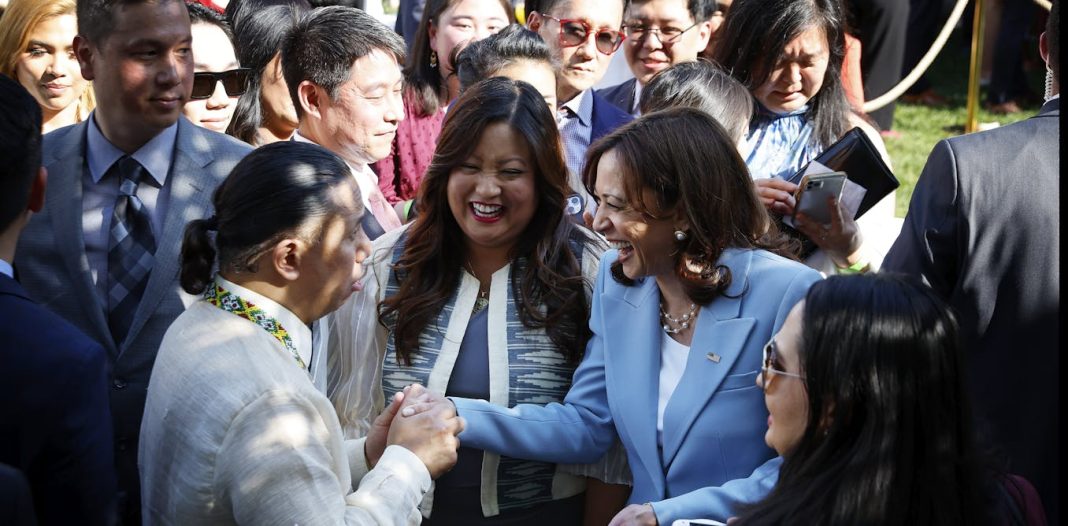Trump’s Controversial Remarks Spark Debate on Identity Politics in 2024 Election
In a striking moment during the 2024 presidential campaign, former President Donald Trump made headlines in July when he claimed that Democratic nominee Kamala Harris had recently stopped identifying as Indian and “happened to turn Black.” This eyebrow-raising assertion has ignited discussions about identity politics and the voting behavior of various demographic groups, particularly Asian Americans, who are becoming an increasingly influential constituency in U.S. elections.
Trump’s comments, which have been widely debunked as false, suggested that Harris was manipulating her identity to appeal to different voter bases. While the underlying assumption of his remarks—that voters are more likely to support candidates who share their identity—has some truth, the reality is far more nuanced. So, do Asian Americans really vote for candidates based on shared identity? Let’s dive into the details.
The Growing Influence of Asian American Voters
Asian Americans have emerged as a significant political force, especially in swing states like Georgia, Nevada, and Arizona, where their votes helped propel President Joe Biden to victory in 2020. As the 2024 election approaches, this demographic is poised to play a crucial role once again. According to recent polls, about 62% of Asian Americans favor Harris, while 38% support Trump. However, this support is not as robust as that of Black Americans, who show a staggering 77% backing for Harris.
Understanding Identity Politics
The notion that voters gravitate toward candidates who share their identity—be it race, gender, or ethnicity—is rooted in the concept of “linked fate.” This means that individuals from similar backgrounds may feel that their experiences and challenges are interconnected, leading them to support candidates who they believe will advocate for their interests. For instance, Latino voters might lean toward a Latino candidate who prioritizes immigration reform, expecting that their shared identity will translate into shared policy priorities.
However, it’s essential to recognize that identity alone doesn’t guarantee voter support. Candidates must demonstrate an understanding of the specific issues that resonate with their target demographic. For Asian Americans, these issues often include the economy, healthcare, immigration, and social security.
Connecting with Asian American Voters
To effectively engage Asian American voters, candidates like Harris need to show that they not only share an identity but also understand the unique challenges faced by this community. For example, many Asian Americans express frustration over lengthy visa processes for family members and the growing backlog of immigration applications. While Harris has spoken about immigration broadly, she has yet to connect these issues to the Asian American experience in a personal way.
Moreover, Asian Americans are significant contributors to the small business landscape, making up about 10% of business owners in the U.S. They are particularly affected by economic issues like inflation and rising interest rates. Harris has addressed these topics but has not specifically tailored her message to highlight how these challenges impact Asian American entrepreneurs.
The Importance of Issue-Based Campaigning
Candidates must also recognize that voters are motivated by issues that directly affect their lives. For Asian Americans, concerns about social security are paramount, as many rely on it as a primary income source. Harris could strengthen her appeal by discussing how her policies would specifically benefit Asian American families and small business owners.
While Harris has made strides in acknowledging her South Asian heritage and addressing issues like hate crimes against Asian Americans, her campaign must go further. To capture the enthusiasm of Asian American voters, she needs to articulate a clear understanding of their concerns and demonstrate a commitment to addressing them.
Conclusion: The Road Ahead for Harris
As the election draws closer, Kamala Harris has the opportunity to solidify her support among Asian American voters. While they lean Democratic, their level of enthusiasm and turnout will depend on her ability to connect with them on a personal level and address the issues that matter most to their community. In a political landscape where identity and shared experiences play a crucial role, Harris must navigate these waters carefully to ensure she not only captures their votes but also their trust and support.
In the end, the 2024 election will not just be about identity politics; it will be about how well candidates can resonate with the diverse experiences and aspirations of all voters.



